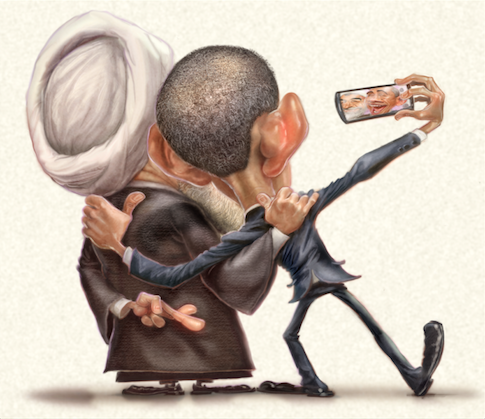Still fooling us
Michael Young/Now Lebanon/September 04/15
To get a sense of how confusing the Obama administration’s policy in Syria remains, recall that about a year ago the United States was preparing to assist the Iraqi government in fighting ISIS. Yet critics of the administration warned that doing so in Iraq and not in Syria was a fool’s errand. ISIS would just shift forces between the two countries and in that way protect itself. At the time, the administration had not completely ruled out attacking ISIS in Syria. Indeed, in a nationally televised address President Barack Obama had declared: “I have made it clear that we will hunt down terrorists who threaten our country, wherever they are. That means I will not hesitate to take action against [ISIS] in Syria, as well as Iraq.”
However, the real question was whether Obama would apply the same logic in Syria as in Iraq. Whereas in Iraq he had argued that a fundamental aspect of the anti-ISIS strategy was to integrate Sunnis into the political system, in that way ensuring ISIS could not exploit Sunni discontent, in Syria there was no such motiviation. Obama continued to reject involving the United States in the Syrian conflict (“somebody else’s civil war,” as he infamously described it in 2013), and completely avoided addressing how to reduce Sunni discontent in Syria. The Obama administration’s attitude toward President Bashar Assad remains profoundly ambiguous. The Americans want him, ultimately, to leave office, but fear that his sudden collapse today might represent a boon for ISIS and other extremists. Yet the United States has also accepted the idea, with Turkey, of setting up a “safety zone” in northern Syria, from which ISIS would be expelled. Much about the zone remains unclear, but it does create options that may affect the Syrian endgame.
Washington’s and Ankara’s approval of the zone facilitated an agreement allowing American warplanes to launch strikes in Syria from Turkey’s Incirlik Air Base. But an ISIS-free zone would also mean securing an area through which the rebels could transfer large quantities of weapons into Syria. This could precipitate the collapse of regime forces in Aleppo. And if the Turks move Syrian refugees into the area, it would provide a vast reservoir of fresh combatants for Assad’s foes. Given all this, is Washington truly happy with all the implications of a safety zone? Or does it worry that it might help precipitate Assad’s downfall at a moment when Washington is not eager for this to happen? That the safety zone has yet to be established a month and a half after the idea was first leaked to the media may tell usa great deal.
The imperative of finding a solution to the war in Syria has been made more urgent by the growing migrant crisis affecting Europe. While the United States has not been affected by this, the pressure is building fast to find a resolution after four years of disgraceful American and international lethargy. However, that has not made the American strategy any more cohesive. As Russia and Iran have engaged in diplomacy over Syria, they have made it apparent that they will not accept Assad’s departure as the starting point of a political process. Can you blame them? They see that the Obama administration is equivocal about Assad’s fate and have no reason to concede the point. That’s why Russia and Iran insist that what happens to Assad can only be decided by the Syrians themselves.
At the heart of the problem is the fact that the Obama administration still regards Syria as important principally due to ISIS.
There is little consideration of the war on its own demerits — a legacy of Obama’s persistent refusal to take on another Arab headache. He can’t see that this has ensured the Americans will be unable to resolve their own dilemma in Syria: they accept that Assad will remain in power, even momentarily, as an enemy of ISIS, while they are also trying to enroll Syria’s Sunnis in an anti-ISIS campaign that they will have little impetus to join while Assad remains in power.
Meanwhile America is implementing the adage, ‘when it doubt, kill.’ Absent a broad, coherent policy toward the country, the administration has engaged in an effort to assassinate ISIS leaders in Syria using drones and special operations forces. This won’t do much harm, but it allows the administration to say it is acting, without posing a major risk to American personnel. The American program to train ‘moderate’ Syrian rebels is ongoing and American commentators friendly to the administration have been trying to reinforce the idea that Obama is serious about it. Perhaps, but until now we have not seen a sustained effort to remove ISIS from the prospective safety zone in northern Syria, nor the kind of American military commitment we saw last year in defense of Kobane.
Nearly five years after the start of the conflict in Syria the United States is still prevaricating. Barack Obama is a prisoner of his own inconsistencies, not least a promise made to Iran’s supreme leader Ayatollah Ali Khamenei last year that American operations in Syria would not target Assad’s forces. With Obama now certain of passing the nuclear deal with Iran, we are likely to see more of the same. Every American move suggesting change in Syria during the past four years has proven to be a mirage. Obama can keep up this game until he leaves office. Not a few Syrians will be happy to see his back.
**Michael Young is opinion editor of The Daily Star newspaper. He tweets @BeirutCalling






















